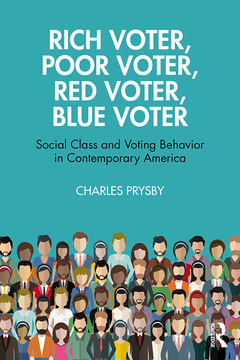Rich Voter, Poor Voter, Red Voter, Blue Voter Social Class and Voting Behavior in Contemporary America
Auteur : Prysby Charles

This book examines the changing relationship between social class and voting behavior in contemporary America. At the end of the 20th century, working-class white voters were significantly more Democratic than their middle-class counterparts, as they had been since the 1930s. By the second decade of the 21st century, that long-standing relationship had reversed: Republicans now do better among working-class whites. While Trump accentuated this trend, the change began before 2016, something that has not been fully appreciated or understood.
Charles Prysby analyzes this development in American politics in a way that is understandable to a wide audience, not just scholars in this field. Drawing on a wealth of survey data, this study describes and explains the underlying causes of the change that has taken place over the past two decades, identifying how social class is directly related to partisan choice. Attitudes on race and immigration, on social and moral issues, and on economic and social welfare policies are all part of the explanation of this 21st century development in American political trends.
Rich Voter, Poor Voter, Red Voter, Blue Voter: Social Class and Voting Behavior in Contemporary America is essential reading for scholars, students, and all others with an interest in American elections and voting behavior.
1. A Changing Class Alignment? 2. Conceptualizing Social Class 3. Class and Voting in Modern American Politics 4. Race, Class, and the Politics of White Identity 5. Cultural Issues, Class, and Voting 6. Economic Issues, Social Class, and Voting 7. Analyzing the 2012 and 2016 Presidential Elections 8. Conclusion: Social Class and Voting in the 21st Century
Charles Prysby is a professor of Political Science at the University of North Carolina at Greensboro. He specializes in American elections, voting behavior, and political parties. His most recent book, coauthored with David Holian, is Candidate Character Traits in Presidential Elections (Routledge, 2015).
Date de parution : 06-2020
15.2x22.9 cm
Date de parution : 06-2020
15.2x22.9 cm
Thème de Rich Voter, Poor Voter, Red Voter, Blue Voter :
Mots-clés :
White Working Class Voters; American Government; Working Class Whites; Political Behavior; Working Class Voters; Political Participation; Middle Class Voters; Voting and Elections; White Voters; Campaigns and Elections; Ane Survey; Political Parties; Party Identification; Democratic Party; Ane; Republican Party; Presidential Vote; Grand Old Party (GOP); Trump’s Appeal; American Politics; Measure Social Class; Voting Behavior; Racial Resentment; Working-Class; Social Welfare Issues; Middle-Class; Partisan Choice; Social Class; Blue Collar Workers; New Deal Realignment; Social Class Differences; Identity Politics; Democratic Advantage; Whiteness; Social Conservatism; Mainline Protestants; American National Election Studies (ANES); Subjective Class Identification; Cooperative Congressional Election Studies Surveys; Higher Income Whites; National Exit Polls; Trump Voters; Party Alignment; Adolescent Family Life Act; Political Ideology; Working Class Support; social welfare policies; Lower Income Voters; Rich Voter; American elections



